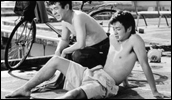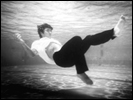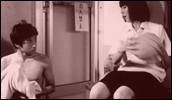Fishes in August
- Year
- 1998
- Original title
- Mizu no naka no Hachigatsu
- Japanese title
- 水の中の八月
- Director
- Cast
- Running time
- 90 minutes
- Published
- 1 August 2002



by Nicholas Rucka
Just as soon as I had written my review of Yoichiro Takahashi's second film, Sunday's Dream (Nichiyobi wa Owaranai), I was handed a screener copy of his first film Fishes in August (Mizu no Naka no Hachigatsu, not to be confused with Sogo Ishii's August in the Water, with which it shares the same Japanese title). I watched it immediately and felt vindicated. Any second thoughts that I had had in making such bold statements about Takahashi's directing genius were dispelled by his freshman outing.
While debatably not as strong as Sunday's Dream, Fishes in August is a solid, well considered work, with bravura performances, and once again amazing cinematography and camera work. Takahashi has simply produced two of the strongest Japanese films that I have seen in recent memory-and only a year apart from each other.
The story once again is set in a sweltering Japanese summer saturated with the hum of cicadas, where everything is slightly fogged by the humidity. Kenji (Mizuhashi) is a third-year high school student who is obsessed with swimming and the freedom that it imparts. Though part of the swim club at school, Kenji cares little for the competitive side of the sport.
Things change when Kenji's classmate Reiko (Ito), whom he has a crush on, asks him to help set her up with his best friend, a Korean-Japanese student named Arai. Arai (Sekino) is the superstar of the swim team and is the direct social counterpoint to Kenji's quiet introverted nature; they are essentially opposites.
Arai sees that Kenji is smitten with Reiko and decides that he is going to set them up. But when Arai appears to be unable to shelve his competitive nature and starts abusing Kenji's feelings both for Reiko and himself, their relationship begins to fall apart and the tension mounts.
There are common elements and metaphors that extend through Takahashi's two film works. They are both set in the summer time, both feature heavy use of water symbolism, both have despondent social outcast main characters who through no fault of their own are unable to associate normally with other people. (In Japanese there is a katakana expression, "My Pace" that describes people who seem to march to their own drum and do things their own way. In both Fishes in August and Sunday's Dream, Kenji Mizuhashi's characters can be appropriately described as such.). But the most profound point of commonality in his works is also the one point that I find most challenging to execute as a filmmaker: the passage of time.
To be fair, expressing the passage of time is a difficult area to nail down for any filmmaker. Famously, the gold standard of clever cinematic time passage has been Citizen Kane and the breakfast that spans the years. The way that Orson Welles chose to compress years of marriage and emphasize the drudgery of its routine, was a point of filmic ingenuity and genius shorthand. Takahashi doesn't attempt anything so bold expanding so many years, but he does a very good job of consolidating many important moments-thereby drawing out their emotional essence.
In Fishes in August, one of the most important points in the film, wherein Kenji and Arai's friendship first begins to fall apart occurs through this amazing long take that holds a passage of time. The scene (which really has to be seen...) is inside of the men's locker room before a large swim meet:
The floating camera shows Arai walking around the locker room preparing for the race. When he walks towards the front entrance, where we can see the swimming pool, judges, and race fans in the background, Reiko walks up and wishes him luck. He blows her off and then as he walks back into the locker room, Arai comes in contact with Kenji. He tells Kenji to swim his hardest for Reiko. Kenji nods in agreement and the two of them exit out of the back of the locker room. The camera then makes a slow tracking shot of the entire locker room (lasting 30 seconds) until it ends at the front entrance where we see Kenji, wet from completing the race, angrily hurrying back into the locker room. One of the members of his swim team compliments him on the fact that he beat his personal best time. Kenji claims that it doesn't matter because he still lost. At which point Reiko comes to the entrance to the locker room and says that she knew that he swam so hard for her and that she was thankful for it. Kenji tells her not to flatter herself and walks away angry. Arai then walks into the locker room and says to Kenji as a way of apology that he couldn't help himself; that he just had to swim as fast as possible.
This is a largely wordless section in the film but is one of great dramatic importance inferring the first major turn in their relationship for the worse. Takahashi told me that the reason they did this scene in one take was because renting a swimming pool in the summer in Japan is prohibitively expensive. So they had to consolidate all of their planned shots into this one long take in order to create the most effective sequence. When asked if he had the chance to do the scene again, but this time with an unlimited budget, he said that he'd still do it the way he did. I agree. This scene borders on brilliance. All of the shifts in the characters' relationships to one another occur off screen, but we get it. There is no extraneous explanation or maudlin slow-motion (dramatic!) race scene of Kenji and Arai, actually challenging each other. But we get it!
And that's the point: we get it. Cinema when done right shows us something that perhaps we know (or maybe don't know) but does so in an innovative, unique, and refreshing way. Takahashi never underestimates the intelligence of his audience and we are so appreciative of this.
As a way of criticism, Fishes in August is a bit heavy on the use of corral, tobacco, and gradient filters-which are slightly tired stylistic tropes of Japanese dramas. But it doesn't matter, this is purely a personal aesthetic and what seems tired for me might be dynamic for the next viewer. Regardless, the film works. Even with its heavy-handed stylistic elements it is engrossing and unique.
The prickly thing about Takahashi's films is their very limited distribution. Fishes in August is available for rental on VHS in Japan. Unfortunately, Sunday's Dream is totally unavailable - and looks to be so for the near future (write NHK Osaka and tell them you want to see it!). Furthermore, for the international audiences, both of Takahashi's films are totally inaccessible. It is unclear whether these films will be screened again in the US, but this might change...
In the meantime, Japanese audiences can enjoy Yoichiro Takahashi's dramas on NHK (produced by NHK Osaka).